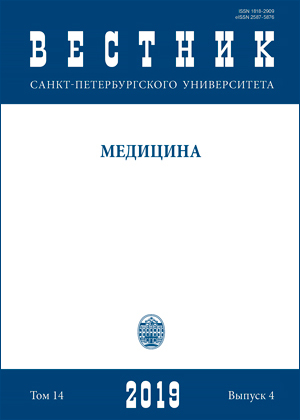Evaluation of Toll-like receptors expression in rat brain under alcoholization and ethanol withdrawal
DOI:
https://doi.org/10.21638/spbu11.2019.412Аннотация
In experiments on rodents and in the study of postmortem brain samples of people suffering from alcoholism, it was shown that ethanol increases the expression of Toll-like receptors in the brain, which persists for a long time. Toll-like receptors are known to be also involved in the development of autoimmune reactions. In the present study the expression of Toll-like receptors in hippocampus, amygdala, and medial entorhinal cortex of rats during prolonged alcoholization and alcohol withdrawal was assessed. In the group of prolonged alcoholization with 20% ethanol for 1 month there was no change in Toll-like receptors mRNA levels in the studied rat brain structures, except for a slight decrease in Toll-like receptor 3 mRNA levels in the hippocampus of alcoholized rats and its slight increase in medial entorhinal cortex. However, Toll-like receptors gene expression undergoes changes in all rat brain structures studied during alcohol withdrawal.
Ключевые слова:
rat, brain, alcoholism, withdrawal syndrome, TLRs
Скачивания
Библиографические ссылки
References
Загрузки
Опубликован
Как цитировать
Выпуск
Раздел
Лицензия
Статьи журнала «Вестник Санкт-Петербургского университета. Медицина» находятся в открытом доступе и распространяются в соответствии с условиями Лицензионного Договора с Санкт-Петербургским государственным университетом, который бесплатно предоставляет авторам неограниченное распространение и самостоятельное архивирование.




